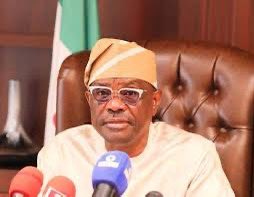Nyesom Wike, the Minister of the Federal Capital Territory (FCT), has accused his successor, Governor Simi Fubara, of turning Rivers State into a private estate. Nyesom Wike, a former governor of Rivers State himself, made these allegations during a public address, pointing out what he describes as “family-centered governance” under Fubara’s administration.
According to Nyesom Wike, the influence of Fubara’s immediate family within the state’s power structure raises questions about fairness and democracy. Highlighting specific appointments, Nyesom Wike noted that Governor Fubara’s wife serves as the Chairman of a Governing Council, one of his daughters holds a commissioner position, another daughter is a judge, and the governor himself wields overarching authority akin to a “general overseer.”
Political Accusations: Nyesom Wike and Fubara Lock Horns Over Governance Style
Nyesom Wike’s claims have cast a spotlight on the governance style of Governor Simi Fubara, whom he accuses of consolidating power within his family. This is not the first time the Rivers State political scene has been marred by accusations of nepotism and favoritism. However, Nyesome Wike’s latest remarks have raised the stakes in what appears to be a battle for public perception.
Governor Fubara, who succeeded Nyesom Wike in office, has maintained that his appointments are based on merit and that his family members’ roles do not interfere with their professional qualifications. Critics, however, argue that such concentrated family involvement undermines public trust and raises ethical concerns about the abuse of power.
A Tale of Two Governors: Nyesom Wike vs. Fubara in Rivers State Politics
The rivalry between Wike and Fubara is a tale of two political heavyweights vying for dominance in Rivers State. Nyesom Wike’s tenure as governor was marked by strongman politics and an iron grip on the state’s affairs. Now, he alleges that Fubara is taking those same tendencies to new extremes by embedding family members into key positions of power.
This power struggle has also brought to light deeper issues within the People’s Democratic Party (PDP) in Rivers State. Insiders say the Wike-Fubara conflict reflects a broader rift in the party, with factions vying for control ahead of future elections. The political infighting could have long-term implications for governance and stability in the state.
Family Ties or Cronyism? The Ethics of Governance in Rivers State
Nyesom Wike’s pointed remarks have reignited debates on the role of family in governance. While some defend Governor Fubara’s actions as a matter of trust and competence, others see them as blatant cronyism that erodes public confidence. The appointments of Fubara’s wife, daughters, and their influence within the state government have fueled allegations of nepotism.
Ethics experts have weighed in, noting that the concentration of power within a single family sets a dangerous precedent. They argue that such practices weaken institutions and create an environment where loyalty to the governor’s family supersedes accountability to the public.
Public Reaction: Rivers State Residents Speak Out
The people of Rivers State have expressed mixed reactions to the ongoing feud between Nyesom Wike and Fubara. Some residents view Nyesom Wike’s comments as sour grapes, accusing him of trying to undermine his successor out of personal vendetta. Others see the allegations as a wake-up call to scrutinize the governance practices under Fubara’s administration.
On social media platforms, the debate has been polarizing. While some users echo Nyesom Wike’s concerns about nepotism, others argue that Rivers State needs stability and that such political clashes only serve to distract from pressing issues like unemployment and infrastructure development.
What’s Next for Rivers State? Political Implications and Future Outlook
As the Wike-Fubara feud deepens, political analysts predict far-reaching implications for Rivers State’s political landscape. The allegations have sparked calls for greater transparency and accountability, with some advocacy groups demanding a formal investigation into the appointments made under Fubara’s administration.
The larger question remains: Can Rivers State move beyond this power tussle to focus on governance and development? With the 2027 general elections on the horizon, both Nyesom Wike and Fubara may need to reassess their strategies to maintain relevance in the state’s evolving political equation.
Table of Contents
Discover more from OGM News NG
Subscribe to get the latest posts sent to your email.














